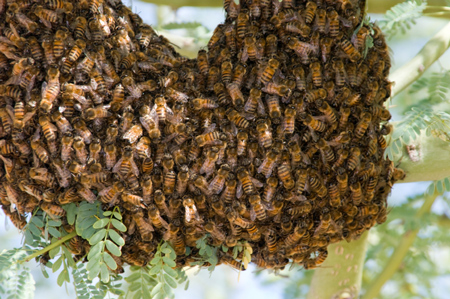Study Shows Africanized Bees Continue to Spread in California
September 11, 2015
By Kim McDonald

A desert hive of Africanized honey bees.
James Metcalf, istock photos
A study conducted by biologists at UC San Diego has found that the Africanized honey bee—an aggressive hybrid of the European honey bee—is continuing to expand its range northward since its introduction into Southern California in 1994.
The study, published in this week's edition of the journal PLOS One, found that more than 60 percent of the foraging honey bees in San Diego County are Africanized and that Africanized bees can now be found as far north as California's delta region.
"Our study shows that the large majority of bees one encounters in San Diego County are Africanized and that most of the bees you encounter are from feral colonies, not managed hives," said Joshua Kohn, a professor of biology at UC San Diego who headed the study.
"The pattern of Africanization we documented in San Diego County and elsewhere in California appears consistent with patterns previously documented in Texas, where Africanized honey bees first appeared in the United States. After the initial wave of hybridization, the remaining bees have a mixture of African and European genes, with the majority of the genome from Africa."
Africanized bees are hybrids of a subspecies from southern Africa that were brought to Brazil to improve honey production, but escaped and spread throughout South America and Central America, arriving in Mexico in 1985 and Texas in 1990. Their aggressive behavior and tendency to swarm victims have led them to be dubbed "killer bees."
Kohn said that while the southern range of the bees has stabilized in Argentina, the northward expansion is still ongoing. He and his graduate student Yoshiaki Kono sought to determine how far and how fast the northward expansion of Africanized bees was occurring in California by examining the genetic markers of 265 honey bees they collected at 91 sites throughout the state.
They found Africanized genetic traits in honey bees as far north as 40 kilometers south of Sacramento in the state's central valley. In the bees they collected in San Diego, they also discovered that more than 60 percent of foraging honey bee workers have Africanized genetic traits, but that African traits are found in only 13 percent of managed or commercial hives.
"Most of the bees you encounter in San Diego are from feral colonies, not managed hives," said Kohn. "Bees from beekeepers are largely European."
The biologists also found that the feral honey bees they collected in San Diego County were smaller than their counterparts in the northern parts of the state.
"One of the ways to tell the two bee types apart is their size," said Kohn. "European bees tend to be larger than Africanized. So bees in San Diego County are smaller than they are further north because further north honey bees are largely European."
Scientists estimate that Africanized bees are capable of expanding their range by as much as 300 to 500 kilometers per year. But because the UC San Diego biologists found Africanized bees only 250 kilometers from their northernmost limit in 2006, they concluded that Africanized bees' expansion rate in California has slowed considerably.
Since Africanized bees have a limited ability to survive cold temperatures, this slower expansion rate could be an indication that they are approaching—or have already reached—their northernmost temperature limits. The biologists said their sampling last spring followed the warmest winter on record for the state and that a continued warming trend, predicted by some climate change models, could further expand the range of Africanized bees.
While the presences of Africanized bees increases the risk of negative interactions with humans, they may provide opportunities for improving the genetic stock of honey bees used in agriculture, said Kohn.
"Feral Africanized bees have replaced European ones everywhere from Brazil to California," he noted. "Part of the reason for this is their increased aggression, but there may be other factors. For instance, Africanized honey bees may be better able to resist certain diseases that afflict honey bee colonies. By dissecting the genomes of Africanized honey bees to find regions responsible for advantageous traits, we may be able to combat recent declines in managed honey bee populations that are so critical for food production."
Media Contact: Kim McDonald, 858-534-7572, [email protected]
